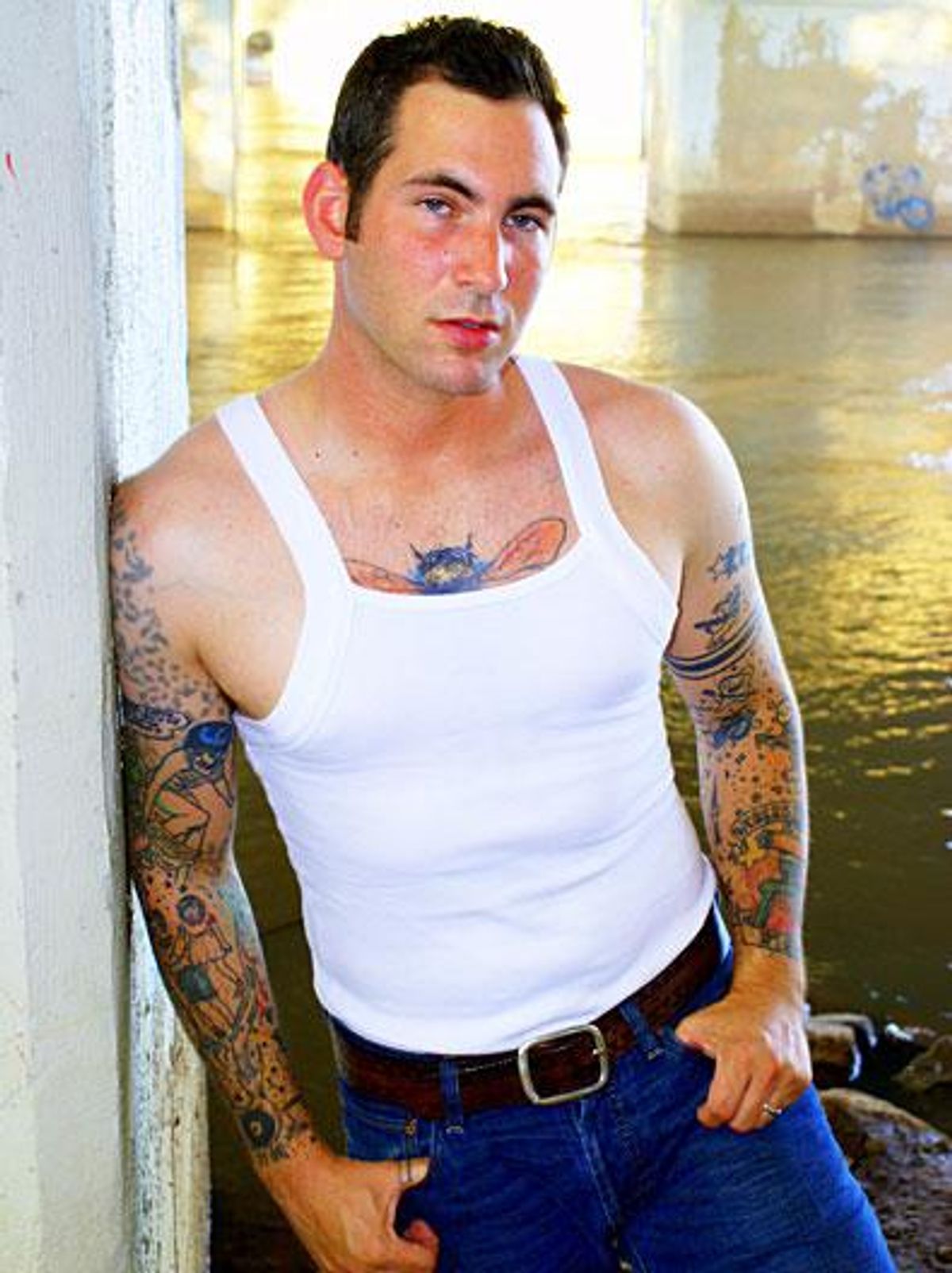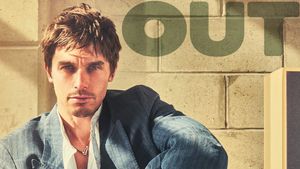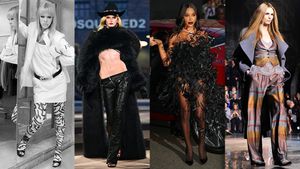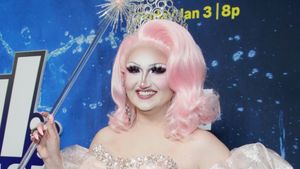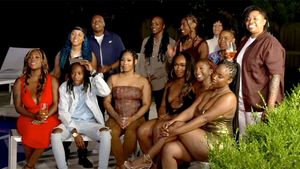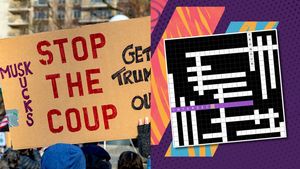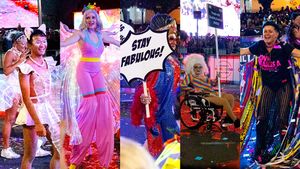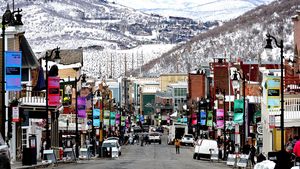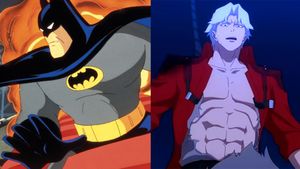This July 23rd, Eric Alva, the gay marine veteran and first soldier wounded in the Iraq War, joined his fellow gay and lesbian service members on Capitol Hill to testify in the first congressional hearings held in 15 years on the US military's discriminatory Don't Ask Don't Tell policy.
On an evening days earlier, and mere blocks away -- at Solly's U Street Tavern in Washington D.C.'s Columbia Heights -- the striking gay, tattooed pop-rocker Eric Himan introduces possibly the only current song written about the issue. He presents his "Protest Song" to a mixed audience of about 50 gays and bohemian looking straights.
"I wrote this song because these were things I didn't really hear other artists talking about: family values, gays in the military..." Himan says. He squares his broad shoulders, tilts his marine style crewcut to profile, and rips into "Protest Song", an aggressive up-tempo rocker rich with the dark blues of Southern Mississippi and the Louisiana bayou.
General, I'm quite capable, my strength is my proofAre you afraid I'll try to sleep with every soldier in my troop?Are you afraid I'll be the hero that you are looking for?And you'd have to thank my f****t ass for winning you your fucking war.
His acoustic guitar sounds as big as an orchestra, and his voice rattles the small upstairs rock club while the Solly's crowd explodes in cheers.
The song means a lot to soldiers like Lane Miller, a gay man in active duty with the US Air Force for 12 years who found Himan's music through "Protest Song." Miller says during his first deployment at age 19--in Turkey supporting the then U.S. military operation in Iraq, Desert Storm--he was frightened of a lot of things; but what frightened him most "was watching them kick people out for being gay."
Although Himan has never been in the military himself, Miller says that with "Protest Song", it's "almost like he sat down with a service member and lived part of it. He has that raw emotion of it too... It's perfect."
***
A few hours before the D.C. show, Himan sits down with me in noisy Cosi sandwich shop just off DC's Dupont Circle. He has a national tour this fall to promote his new album Resonate, and after seven years of pounding the proverbial 'road' and building a devoted following, this might be the tour that propels the indie singer-songwriter and his folk-inspired pop-rock to a new level of mainstream visibility.
On stage, the 29-year-old sports an impressive build, one which he has no qualms about working. He wears a form fitting t-shirt and jeans that could have been bought from the nearest Goodwill bin. Meeting him up close though, he's surprisingly small. But with his heavy ink and full features, he is still arresting.
"I write songs about my feelings, my opinions -- things that have happened in my life," says Himan. "Sometimes, I just want to know that somebody else feels the same way. And sometimes that's the greatest thing in the world. To make that connection."
Himan's ability "to make that connection" in such an authentic, person-to-person way is what makes him special. Drew Waller--a gay Borders Books executive responsible for a major deal Himan has with the chain to carry his new CD and sponsor in-store concerts--says part of the reason such an under the radar artist got the gig was his ability to create the kind of "interactive" atmosphere Borders was looking for.
"He would draw new people in," says Waller, and whether it was an audience of 10 or 100 "everyone had a great time, I think that that was really his one jewel. His connection with the audience."
Just don't call them "fans" in front of Himan.
"I have this hate relationship with the word 'fans'," he says. "It sounds like somebody's talking down from their big mountain... It's very territorial." He leans in, gingerly touching my arm with the mock condescension of a preening celebrity: "Hey, fan!" He leans back laughing. "It just sounds awful."
No matter what he calls them there are a lot of them and from all walks of life. Himan's last single "Little Boy Blue", tells the story of a transgender boy Himan met at one of the many LGBT youth centers he visits while traveling the country. Himan says that after he put the song up on his myspace page one trans youth messaged him with the screen name littleboyblue telling Himan the song had saved his life. Another trans fan devoted an entire web page to the song and video.
Himan's own story was shaped by early tragedy. When he was four, he was the sole survivor in a car crash that killed his mother and a sister. His father, a military man, had to move Eric and a younger sister frequently and often at short notice. Living in Southern Florida in 1992 when Himan was 13, the family lost everything in Hurricane Andrew.
Himan's aunt wisely invested insurance money from his mother's death so he could attend Penn State. Then, on the heels of his 2001 graduation, Himan hit the road as an indie artist. And that's where he's been ever since.
Unlike most gay rock or pop acts, Himan has been out since his first, self-titled CD release in 2000 while he was still in college. He says he felt dissatisfied with the gay male role models that were out there.
"How can I sit here and write songs about my life and omit one part of it that I have a connection with an entire community of people. That's ridiculous."
Starting out, Himan played small, grimy bars and coffee houses where he might only get one or two people at a show. But within just a few years Himan was packing small but established rock clubs like Uncommon Ground and the Bitter End in New York. The last two years he's been playing even bigger venues: World Cafe Live in Philadephia, and New York's Zipper Theater--not to mention playing the 2006 Gay Games in Chicago where he performed for 80,000 screaming fans in Wrigley Field as the opening act to Cyndi Lauper.
As an artist known for his accessibility, Himan expresses sincere concern that as things have grown, "It's getting a little out of hand, where I can't email everybody as fast as I used to," explaining that because of the volume of correspondence he receives, it may take two weeks to respond where it used to take two days.
And he's not talking about journalists, club owners, and promoters. He's talking about his audience, and considering most artists never correspond directly with their fans, I tell him a two week turn around is pretty good.
"I can't imagine how some musicians say 'Oh I never check my MySpace, or I never answer anybody back," replies Himan. "And I'm like -- 'You're losing out on making so many connections with people.'"
When he plays places he's been before, Himan says, "People tell me, 'You remembered my name! You remembered my face! You remembered what we talked about last time!'. And they're so surprised. But I'm not. I don't just write songs so people like them and walk away. I write songs because it's part of the way I process. And I think the thing that I've realized with being a musician is that I've put out my story almost so other people will tell me theirs."
For someone who's had so much family loss and uncertainty connecting with all of those people might make him feel protected, as if he's always surrounded by an extended family.
Himan agrees, "I'm not trying to say I want to be everybody's best friend, or that I have the right to be."
Then he tells me about seeing a well-known artist explain that when they perform they don't want to see faces; they want to look out and just see "the black". Himan sees himself as something very different. "I don't want people to be faceless."
***
"You know, I can do this myself," Himan teases someone in the front row at Solly's who apparently knows all the words, and is proving it - loudly. "On the next one, maybe we can sing harmony."
Himan gives the guy a big, mischievous smile. He clearly enjoys the enthusiasm.
Against the sounds of scooping ice, and clinking glass from the bar in the back, Himan confides with us, as if sharing with a group of his closest friends: "I'm supposed to be this serious, out singer-songwriter, and I can talk on and on about songs by Bob Dylan and Joni Mitchell. And then a Madonna song will come on -- and I'm like 'Oh Madonna!' ... ruins everything."
There's laughter followed by a spontaneous cavalcade of shouted, vintage Madge requests: "True Blue!" "Papa Don't Preach!" "Vogue!"
Himan laughs. He'll often throw in a surprise in the middle of a set: a Madonna or DollyParton song, or something from the current top 40 roundup-"Umbrella" by Rihanna, "Bleeding Love" by Leona Lewis.
But this time he plays a new song from his current album titled "We Are the Same." "This is a song I wrote for a movie," Himan tells us quietly. "But I decided to keep it for myself."
At Solly's the warm spring night comes through the open windows, and Himan begins to sing in the soft, wise voice of a grown-up lullaby...
I don't know whyfear swells insideWhen we are faced with differenceThis world is too small to be scared of it ...If we could talk, we both could listen. Understand how we are different.Then maybe we could see - We are the same
- Eric Himan is currently on tour throughout the United States. For more information, visit www.EricHiman.com
